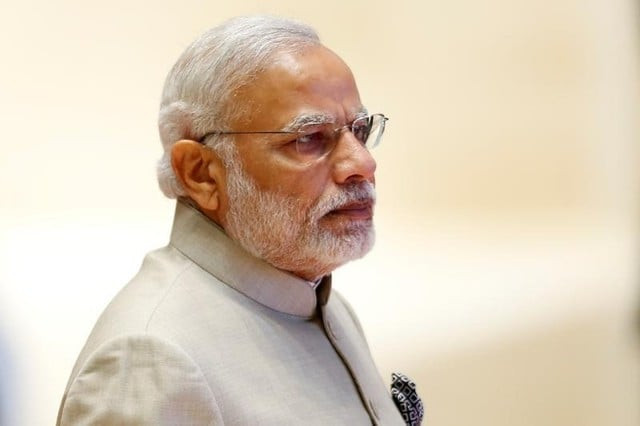Beyond India’s BRICS humiliation
Delhi’s self-belief that it can shape the global narrative about a country it detests seems a far uphill task

India's Prime Minister Narendra Modi arrives at the ASEAN Summit in Vientiane, Laos September 7, 2016. REUTERS
The pomp and show at the Goa conference lost its lustre when the host attempted to transform the grouping of eight newly industrialised countries into a security alliance. For the decade-old economic grouping, its eighth meeting could not even sustain that feel-good image. Being high on hate and anger against Pakistan, Narendra Modi gave away subtle covers of diplomacy for bluntness. India’s former premier Atal Bihari Vajpayee was no less of a BJP ideologue. He could lay the foundation of a long-term project to strengthen India against Pakistan, including initiation of talks with US for civilian nuclear plants and military hardware.
The prime minister of India is posturing himself as a warrior king in the league of Rajendra Chola, Chandragupta Maurya and Prithviraj Chauhan. The Chinese and Russians stepped up to his rude awakening. The leaders of Brazil and South Africa too found India’s focus beyond economic issues awkward and out-of-place. Delhi also invited Bangladesh, Myanmar, Bruma, Nepal and Thailand with the hope that a forceful condemnation of Pakistan will signify regional and global isolation. The self-styled warrior king overlooked what Chanakya Kautilya had advised his types in Arthashastra that a reckless king will easily fall into the hands of his enemies.
China defends Pakistan after Modi's 'mother-ship of terrorism' comment
Though Russia and Pakistan relations have improved significantly over the past decade, they will remain constrained due to a multitude of factors. While Islamabad will continue to engage Moscow for its diplomatic and military needs, Kremlin won’t write her off in times of geostrategic realignment. However, Putin’s gesture at Goa summit must not be read beyond appeasement of Pakistan.
The Goa summit was a vivid testament of Modi’s aspiration instead of continuation of the previous gathering in Ufa, which brought to the fore New Development Bank or BRICS Bank. The organisation is faced with multiple challenges, geo-economics being the toughest of them all. Delhi assumption of global exceptionalism is deeply flawed. Being part of a defense agreement with the US, it can’t continue to receive goodies from Russia except for the ones already in the pipeline such as lease of the second nuclear-powered submarine. Meanwhile, Delhi must have least expected a favourable response from Beijing while subverting China’s economic corridor in Pakistan to the Arabian Sea.
Merely a couple of weeks back, Delhi torpedoed SAARC Summit by violating its very charter. Since the bloc’s inception, it was India instead of Pakistan that opposed raising contentious security issues at the forum. The debating forum started becoming increasingly overwrought since America forced Kabul to become a member, broadening the map of South Asia to the farthest edge of Afghanistan. If the forum’s efficacy can be any guide, Islamabad won’t be at a loss if it dumps its SAARC membership for good. However, what would remain of SAARC if Pakistan opts to quit the organisation?
Due to Modi’s brinkmanship, the other option is equally worse for India. Not to mention Pakistan; none of the other six SAARC members will be in a position to reject Chinese application for membership. Bangladesh, Nepal, Afghanistan and the Maldives enjoy excellent relations with China.
Modi’s BRICS offensive falls flat
To invoke security warnings, India will have to wait for its membership of the Shanghai Cooperation Organisation next year. Paradoxically, Pakistan too will be joining the forum at the very same time. Like BRICS 2016, Russia and China won’t let the forum be hijacked by Narendra Modi. Undeniably, the Indian public has been buying into the hawkish rhetoric of Rashtriya Swayamsevak Sangh (RSS), whereby extremist right-wing parties gain unprecedented popularity through voter turnout. Thus, Modi is hostage to his own dangerous stratagem of fanning hatred against Pakistan, and religious minorities at home. Even if India’s external affairs ministry recommends toning down the anti-Pakistan rhetoric after the failed summit at Goa, the Gujrati politician won’t risk enraging Hindutva evangelists in power corridors and streets alike.
Naveed Ahmad is a Pakistani investigative journalist and academic with extensive reporting experience in the Middle East and North Africa. He is based in Doha and Istanbul. He tweets @naveed360\



















COMMENTS
Comments are moderated and generally will be posted if they are on-topic and not abusive.
For more information, please see our Comments FAQ